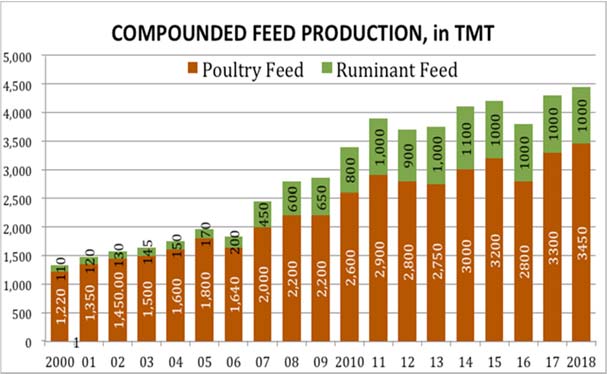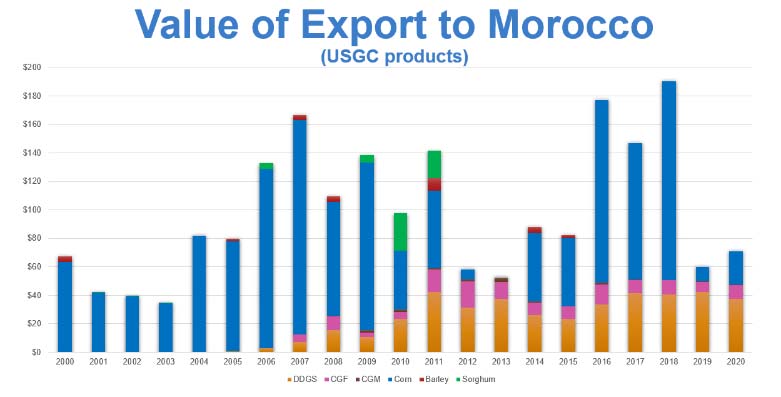Morocco is the United States’ first and only free trade agreement (FTA) partner on the African continent and an example of the growth potential possible with a combination of strong trade policy and long-term market development. The U.S. Grains Council and its partners in Morocco celebrated the 15th anniversary of the U.S.-Morocco FTA in 2021.
The FTA has created tremendous opportunities for U.S. agriculture by reducing market barriers and stimulating growth in Moroccan industries
that import agricultural products from the United States. Total U.S. exports to Morocco reached $1.2 billion in 2020, compared to $35 million in 2005 before FTA implementation. Before 2005, corn imports by Morocco were small, hindered by an import duty on corn reaching as high as 85 percent. As a result, the poultry industry was highly fragmented, poultry consumption was low, and the dairy and beef sectors struggled to keep up with the demand for milk and beef products.
The Council initially entered Morocco in 1995 when it began working on expanding the poultry industry through the formation of a producer association, FISA, on representing the poultry and feed value chain. In the intervening years, the Council has partnered with FISA to advocate to
the Moroccan government on issues that would allow the industry to grow and develop in a stable and transparent environment. The Council also partnered with FISA to provide technical support to industry members to promote poultry industry development.
Since FISA’s formation and later through the FTA implementation, corn imports to Morocco have grown from 450 thousand metric tons (TMT) per year (17.7 million bushels) to 3 million metric tons (MMT) (118.1 million bushels) per year. Additionally, per capita consumption
levels of poultry meat have grown more than three-fold from three kilograms (kg) (6.61 pounds) per capita in 1995 to 22 kg
(48.49 pounds) per capita in 2020.
The FTA and the evolution of the poultry and feed industries also allowed the Council to introduce new feed grains to the market beyond corn. These include U.S. distillers dried grains with solubles (DDGS), corn gluten feed (CGF), corn gluten meal (CGM), barley, and sorghum. The introduction of a variety of feed grains to the Moroccan feed industry has created more depth and flexibility and has benefitted a wider range of U.S. producers.
Recently, one of the Council’s Moroccan partners, a dairy cooperative, imported 1,750 pregnant Holstein heifers from the United States. In fact, in the past ten years, the cooperative has imported more than $205 million of U.S. agricultural products, including corn, soybean meal, DDGS, corn gluten feed, livestock, dairy genetics, and soyhulls averaging $20 million in imports
annually.
These sales and developments would not have been possible without the FTA, which removed barriers to U.S. exports and allowed the Council to engage in a robust partnership with the Moroccan livestock industry.
About The U.S. Grains Council
The U.S. Grains Council develops export markets for U.S. barley, corn, sorghum and related products including distiller’s dried grains with solubles (DDGS) and ethanol. With full-time presence in 28 locations, the Council operates programs in more than 50 countries and the European Union. The Council believes exports are vital to global economic development and to U.S. agriculture’s profitability. Detailed information about the Council and its programs is online at www.grains.org.


